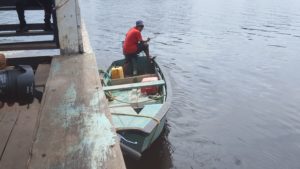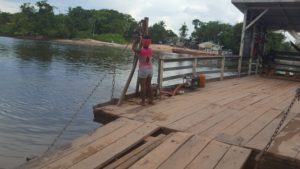
By Lakhram Bhagirat
If we travel the length and breadth of this world, we will find women doing extraordinary things and quite often venturing into fields that are not traditionally considered appealing to a woman and one can say the same for Anasha Simmons, but according to her she loves what she does.
Anasha is a 29-year-old mother of two, and she is very assertive in what she does. If you ever have the chance to visit the Kwakwani community in Region 10 (Upper Demerara-Berbice), you will definitely come into contact with her since she is one of the few persons who would be available to take you across the Berbice River on a pontoon ferry pulled by a cable.
Anasha operates the cable ferry (commonly called a barge by the locals) to take people and vehicles across the river into Kwakwani, and she has been doing that for about two years. She said that the reason she started was to protect the interests of her cousin who owns the ferry, explaining that people would often “wrong deal” her and she was asked to come work the ferry.
“I do everything. I drive, I collect money, I pull the chain. We make a couple trips— like 10 to 15 trips for a day. I like the job a lot and if you don’t like something, then you shouldn’t do it. It is very fun for me and I just like working,” the Kwakwani native said.
The single mother said the earnings from operating the ferry is what supports her and her children aged six and nine. Additionally, she is also involved in logging up the Berbice River, making both of her jobs a step away from traditional female jobs.

At the Kwakwani Landing, you can always see Anasha sitting on the ferry awaiting the next customer over the river. She would direct your vehicle onto the ferry, pull the makeshift stairway, and direct the boat operator on how to park so it makes for easier disembarking.
If you also have any issues with your vehicle after driving for over three hours from Linden to the Kwakwani Landing then she is the right person to ask for assistance, as she knows where exactly to send you to have repairs done.
On our trip to the riverine community, we were fortunate to see her in action as well as get her advice since our minibus required a tyre change after the rough three hours plus ride. During our visit to the community, we were met by a plethora of nice people, and it made the experience even more memorable.
We saw women breaking away from the traditional stereotypes we are accustomed to seeing because that is how they were taught. They were taught that they can be whatever they want to be, whether it is a logger, since the community is heavily dependent on logging; a miner; a ferry operator or even a doctor.
Our team was fortunate to see an entire hospital that is practically run by women, who are pushing the boundaries and effecting change.
Kwakwani is a small community of just over 6000 residents and can be accessed by land and water. The community, as earlier indicated, is heavily dependent on logging and mining as its main sources of economic activity.(Times Sunday Magazine)



